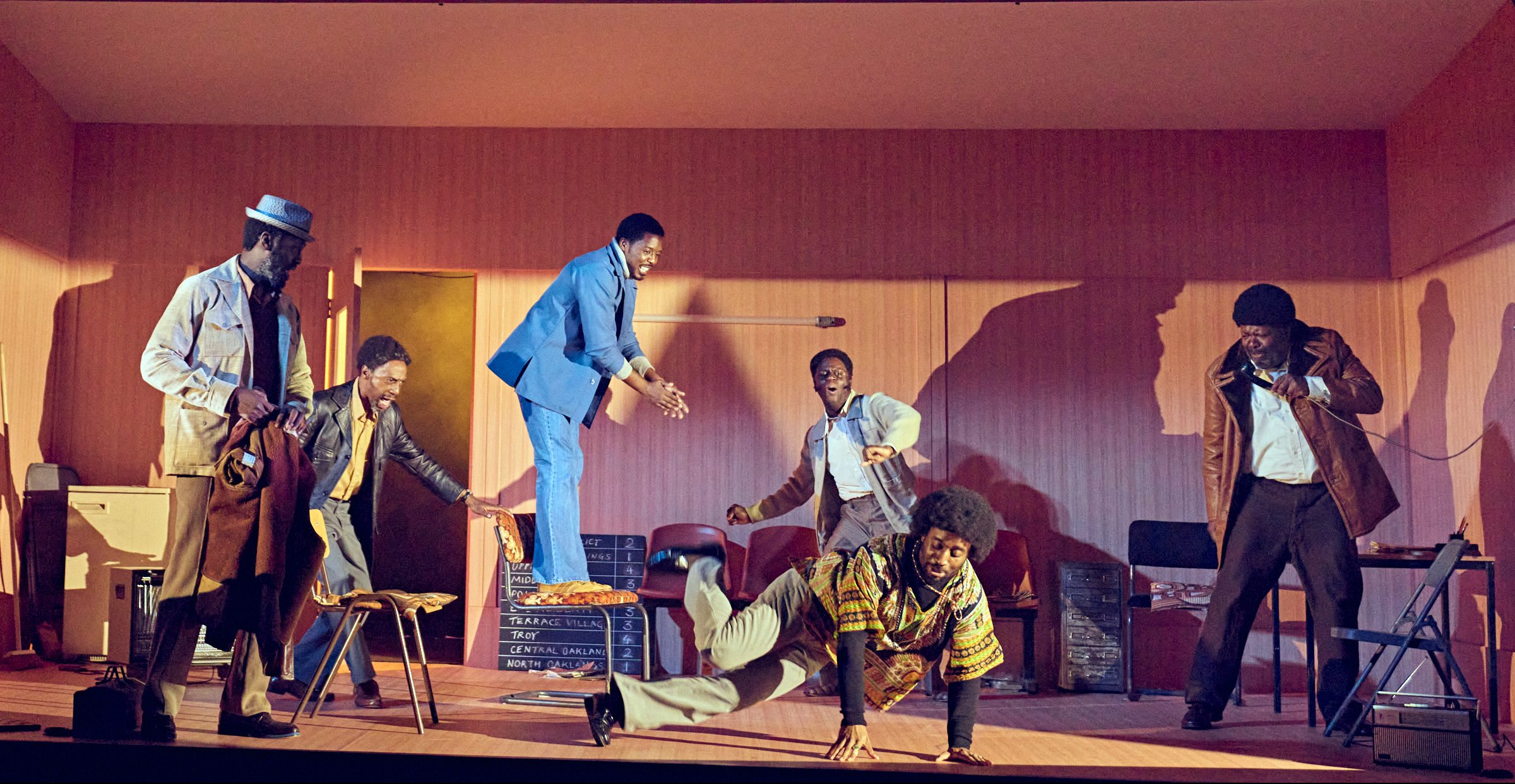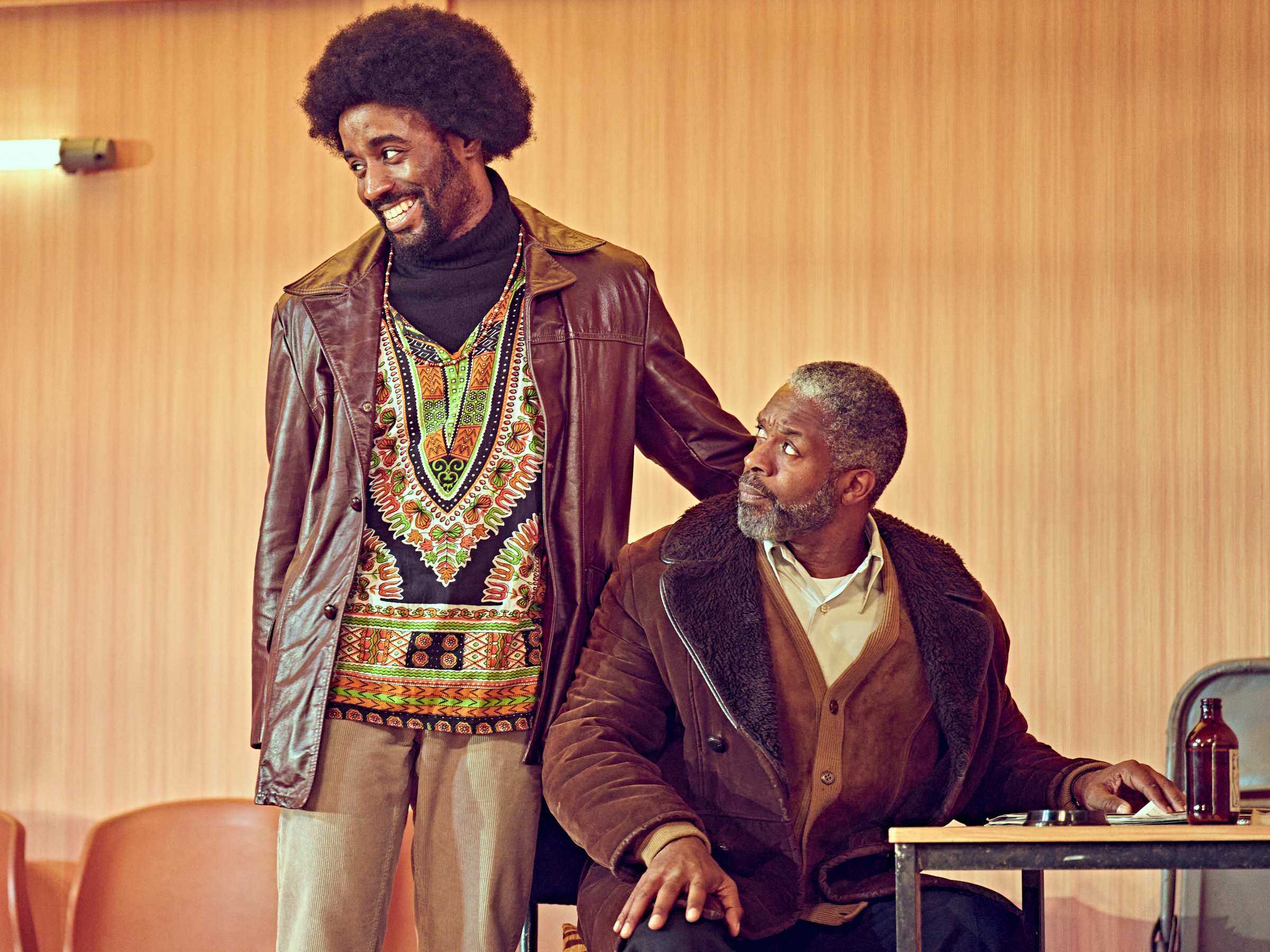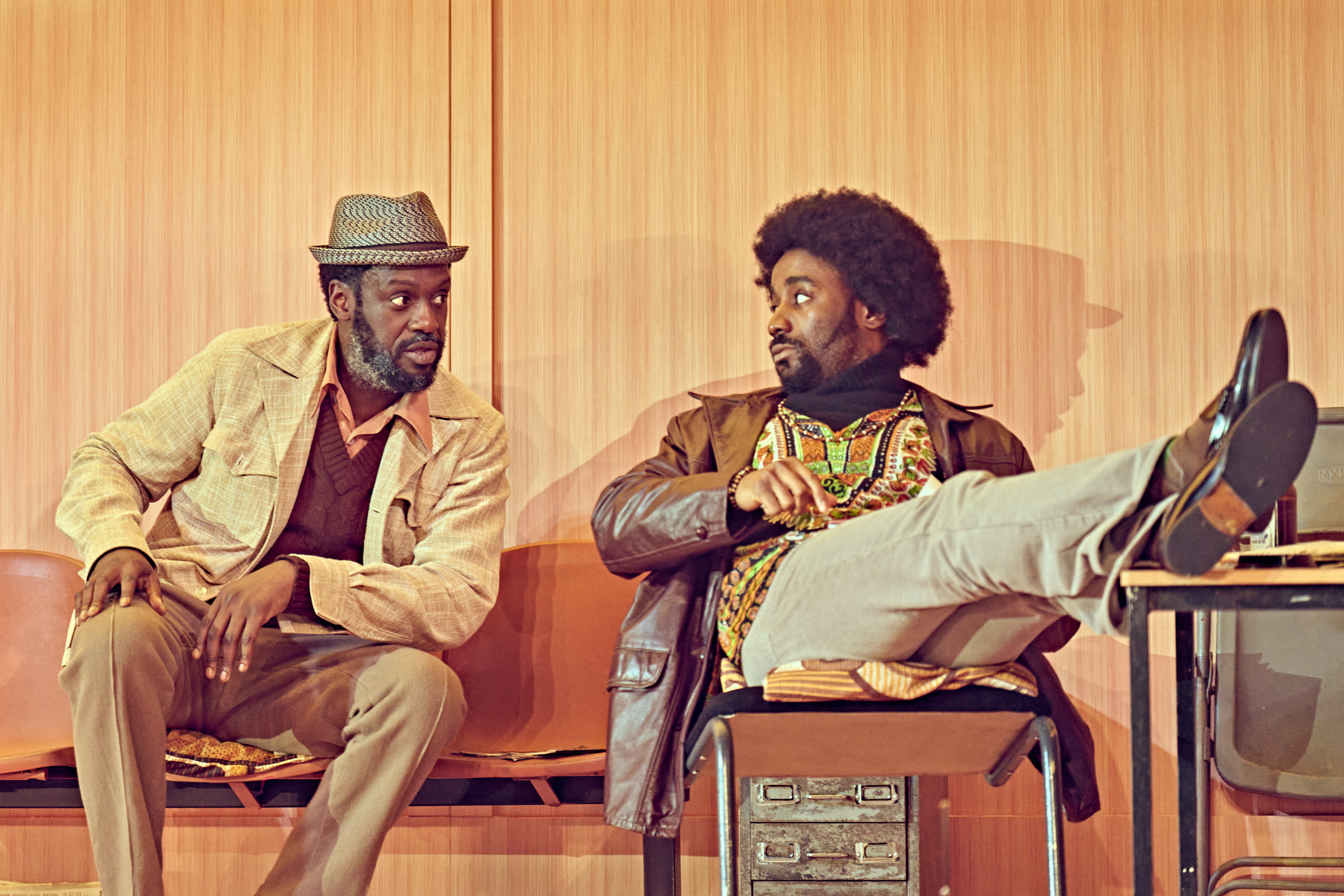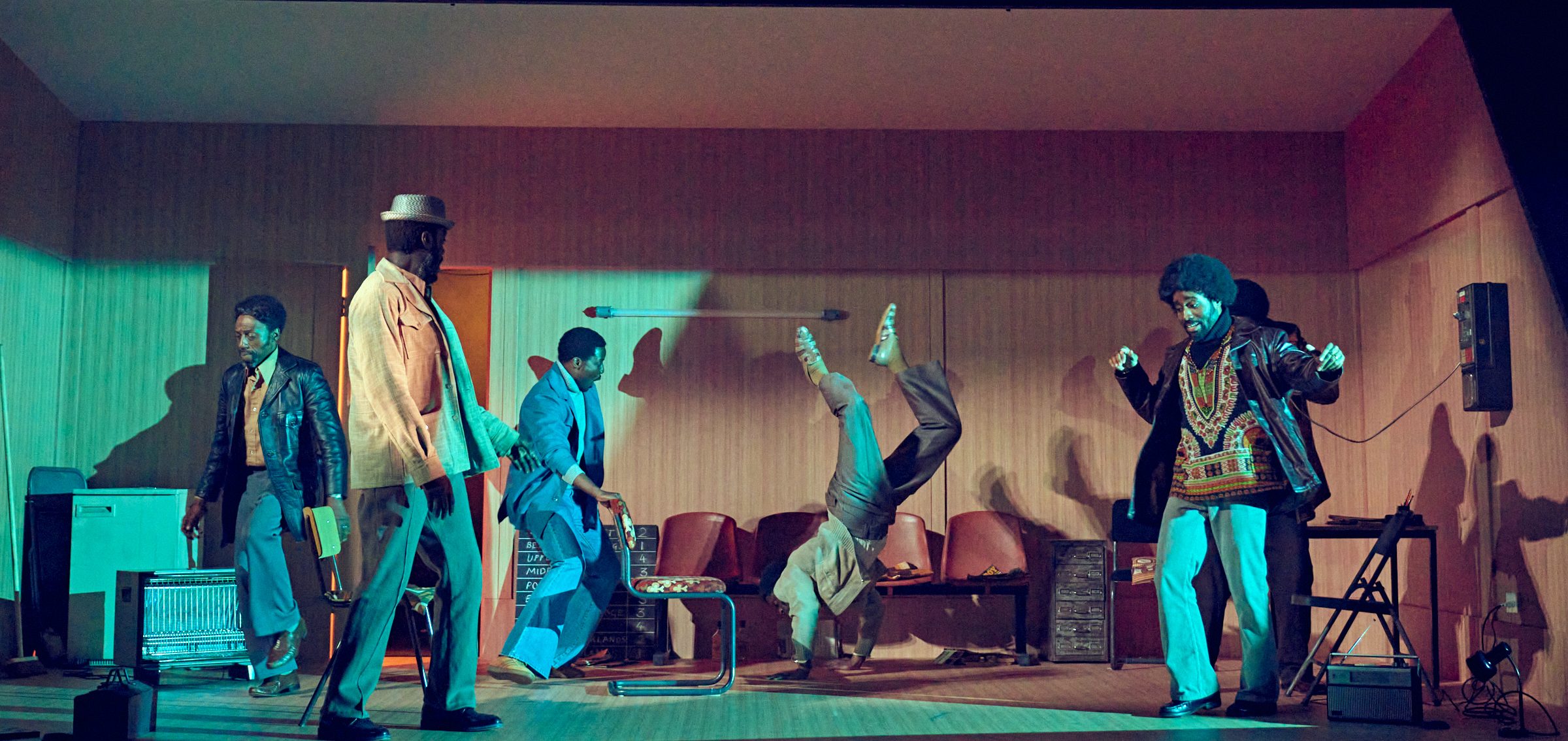
At the start of this play, a black man puts on his coat, as if he’s about to leave for work. The music and strobe-lighting change subtly; as if signalling imminent upheaval. And so, it goes on.
This play by legendary playwright August Wilson – technically the first of his celebrated 10-strong ‘American cycle’ – is set exclusively in a ‘jitney’, in 1979-era Pittsburgh, Pennsylvania.
Director Tinuke Craig holds things together with simplicity and commendable assuredness.
To be clear, a ‘jitney’ was common vernacular for an unlicensed taxi-cab; the name garnered from the commonly-used slang term for a nickel – in itself, a nod to the ‘nickel ’n’ dime’ fares that these vehicles were forced to charge, by virtue of their illegality.
Alas, gentrification and the virtual abolition of unlicensed (i.e. non tax-paying) taxi driving put pay to these enterprises at the end of the 70s. For a time, though, they served a valuable service to those blue-collar African-Americans who were disallowed from renting or buying property in the vicinity of their inner-city employment (either through lack of funds or as a result of racist lending, letting or home-buying policy or individual bias).
As a result, they often had a tortuous public transport trip, with many changes, diversions or deviations. This would be bad enough at the end of a hard shift; for those who needed to get to a second job, or to a young child at a prescribed time – it was unthinkable; their only option was the aforementioned – relatively inexpensive – unlicensed ‘jitneys’.
The cast – all but one of whom is male – is universally good. The stand-outs, for me, were Wil Johnson as the owner and de-facto leader of this varied assemblage of black males; his performance was measured and contained for one minute, before uncapping a deep well of sorrow and grief so affecting, it felt almost intrusive. Anyway, more about him later. Other stand-outs included Tony Marshall as ‘Fielding’, a functioning alcoholic [yes, he drives for a living] with a truly affecting back-story. His physicality and emotional choices were truly on-point.
In short, I would recommend this production highly.
Mention should also be given to Sule Rimi as ‘Turnbo’, and to Geoff Aymer as ‘Doub’; the former switching from humour-inducing social gossip, to an unstable ‘potential mass-shooter’ (and back again), while the latter knots the ensemble together with just the right amount of coiled energy and ‘expressive introversion’.
In respect to the set, the interior of the cab office doesn’t change much. However, on its exterior, framing images of American roads and shots of inner-city life are projected, manipulated and re-coloured at regular intervals, and to great effect.
Alex Lowde should be commended for his set design and for the costume choices; both are tasteful and well-observed. Elliot Griggs and Max Perryment are also worthy of extra praise for their work on lighting, and for the Sound and Composing.
Lastly, Director Tinuke Craig holds things together with the simplicity and commendable assuredness. I’m sure that a lot of her work was in creating an environment that was safe and nurturing, but also permissive and exploratory; she succeeds well, I feel. She trusts her actors; their performances and dialogue seem to come from ‘real people, rather than be the end result of a ton of ‘creative notes’. Also, her transitions – alongside the sound and lighting elements – were consistent and effective.

In hindsight, it’s little surprise that August Wilson used this rich seam as a setting for his first play; doubtless, he had much need of their services, as he moved from theatre to theatre; office to office; rehearsal to rehearsal (not forgetting the ‘work-and-home’ equation), in his formative years a struggling playwright.
He probably recognised the ‘JITNEYS’ as a vehicular version of the local barber shop (‘The Black Man’s Country Club’): probably one of the few ubiquitous public forums at that time, where many black men could safely ‘be themselves’ in the company of other men ‘like them’ (bars and clubs notwithstanding).
Interestingly enough, Wilson sets the entire play within the confines of the cab office itself; no cut-aways to dramatic cab rides, star passengers, drunk fares or… anything. Any dramatic, or noteworthy, rides are given to us either in the course of the fast-paced, authentically rendered dialogue between them, or prefaced when one of them takes a fare (the irregularly-ringing phone being a constant preoccupation for the drivers – and a vital deus ex machina for the audience.
Indeed, the reverence with which the telephone is treated – not to mention the touching denouement – mark it out as, not just a major (supporting?) character, but the play’s unheralded ‘silent partner’, benefactor and – for the cab drivers themselves – their equivalent of a roulette-wheel spin in the casino; each call, for which they are next in line, offering salvation… or ‘nickel and dimes’ disappointment… once again.
What the sitcom-paced series of scenes show, however, is the vast range of dramatic possibilities to be unearthed when disadvantaged, moderately desperate and/or fatalistically resigned men – most ostensibly ‘in the same boat, and trying to reach the same basic objective – are forced together.
The delicate balancing between patience and exasperation; jealousy and disinterest;- sage, patient forward-thinking and reactive, nihilistic self-sabotage; tension and relief; proportionate responses and heightened over-reaction; ambition and addiction-fuelled resignation; they’re all here- and more, besides.
The characters are all well-enough drawn – their characters and dialogue sufficiently upholstered (sometimes with just a brief, heart-wrenching aside), allowing much scope to contextualise and – if not vindicate, then – perhaps begin to understand their present financial and/or social predicament (s).
To be clear, none of these gentlemen would – if they each had a choice – opt to drive a ‘jitneys’ cab; or any, for that matter. they are here because they have no choice; indeed, some – as we grow to see – can see no other possibility for themselves in the ‘working environment’. This is the last-chance saloon (or corresponding low-cost vehicle-of-choice).

This play is ultimately about what happens when a large sub-section of males historically and habitually face extreme racial prejudice, disenfranchisement, and societal and financial exclusion, Of course, being socially, financially and ‘racially’ secure does not mean that those so ‘advantaged’ don’t sometimes fall from grace as a result of their own bad choices. However, as most are surely aware, being secure in these areas generally allows for more time, a greater number of actions/options/alternatives and a certain stable platform from which to perceive the best course to steer, improve or, at least, continue on this successful trajectory.
I’m sure there are copious articles, books and papers using terms such as ‘toxic masculinity when discussing black men and boys in American inner-cities; some may even point to a lack of ‘black fathers’ within ‘the community. But I’m pretty sure that any African-American ‘man’ would have his mental ‘wellbeing’ poisoned by a constant – and historically consistent – disregard for his basic human rights… and those belonging to anyone who looks like him.
Surely, in this situation, a young man’s refuge should be his ever-present, loving and dutiful father. However, as we get to hear during an absolutely stunning duologue between father and son, the latter’s affection turned to dissatisfaction and disappointment upon realising that his honourable father – a highly-principled ‘big man’ in his own community – is a hypocrite; specifically when dealing with dishonourable, or disrespectful white people, as he says his father would not let those from his own community cross him so unopposed.
In a teenage fit of willfulness, he keeps this information to himself but uses this most ‘Oedipal’ of discoveries to set in motion a chain of events that will see him committed to prison for 20 years, his mother dying of a broken heart, and his father surviving his own ‘emotional heart-failure’ – and the literal loss of his family – by creating, and upholding the standards of, this ghetto cab office.
Within a truly superb ensemble cast, Will Johnson is magnificent as ‘Becker’, the owner of the franchise, and the aforementioned father who has managed to transmute all his unexpressed love, grief and rage by becoming an unflappable, ever-dependable lynchpin of the cab office, and – by extension – ‘his community’.

In an extraordinary scene between himself and his newly-freed son (Blair Gyabaah), we see his hitherto stoic, sure-footed persona give way to a resentful wreck of a man who cannot bring himself to love a son who was, not only responsible for his wife’s untimely demise (her grief-stricken response to her son’s crime and subsequent incarceration), but also his hopes and dreams regarding his descendant’s slow, inexorable rise towards equal status; in actual deed, as as opposed to the rarely-enforced written word that everyone knows was not written down with ‘his kind’ in mind.
His belief – nay, faith – was that, by ‘getting along’ and staying out of trouble, his lineage might, one day, live in a time where the human rights of Black People were defended as rigorously as those of Whites, and would be universally accepted as equal. Of course, like MLK, he didn’t expect to see that day but – like so many of that generation scattered far and wide across the Whites-dominated diaspora often described as ‘The West’ – that dream made his living nightmare bearable, as well as his duty as a father.
Wil Johnson’s slow, hand-trembling descent into almost catatonic rage and grief is extraordinary. We can almost see years of focussed control suddenly flee his body unbidden, as he reveals his hidden pain and anguish for the first time – perhaps even to himself.
Upcoming generations rarely see eye-to-eye with the preceding one – especially not at a time when youth’s ‘Oedipal urge’ is so ‘quick on the down take’, at times. Still, his son didn’t play ball, and another black family’s generational hopes went up in smoke, alongside the gun vengefully used by his son in an overzealous bid to ‘right a racial wrong’, while simultaneously gaining satisfaction for a personal insult. And yet – even after 20 years in prison, and the attendant difficulties he must face as a newly-released ex-criminal – he feels his personal honour has been upheld; failing, it seems, to understand the level or scale of the loss and betrayal that his grief-stricken father is at such pains to communicate.
Of course, when his crime – and subsequent release – are added to any statistical report, I’m almost certain that the following phrase might go unwritten: ‘contributing factor for violent transgression might be a response to an ancestral past, a persistent present and an entirely plausible far-flung future in which racial prejudice, cultural bias and systemic discrimination towards himself, family and peers were perceived as his one consistent expectation’. Of course, I’m sure that August Wilson would not have been so crude as to downplay personal agency’; thereby excusing a man’s present transgressions on a dead ancestors hardship; nor would I suggest him devoid of the requisite optimism to hope for a more equitable future for our species.

However, in this play – and more specifically, within this scene – he seemed to spell out the implausibility of black men becoming ‘toxin-free’ any time soon: not only are a great many individuals, as well as many institutions – both public and private, no doubt – reluctant to stop heaping s*** on ‘the blacks’ but there is also the (eternal) cross-generational divide to navigate (group-perception, future course., etc).
Ultimately, those who are truly privileged are the recipients of substantial generational – or ‘inherited’ – wealth. To go through one’s entire life without having to consider having no food, shelter… or yearly holiday is a reality unjustly denied to countless millions over considerable many generations; the disparity in treatment, outcome, life expectancy, basic quality-of-life, etc; is so ‘baked in’ for many living in low-cost ‘pack-‘em in’ accommodation, as to be almost self-perpetuating… and that’s before any individual (white) societal representative gets involved.
August Wilson was not only a keen student of human nature; he was also – as far as I can gather – a realist. What he has done is quite remarkable: he has given a snapshot of a ‘changing of the guard’, a non-cliched look at a group of regular black men pushing in the same direction and moving forward together (occasional gun-waving notwithstanding); lastly, he has given a clear message that – no matter how much ‘The Patriarchy’ is responsible for the continued suffering of countless black folk in America – the most important engagements are the ones we have with our own family and close community.
In short, I would recommend this production highly.



























